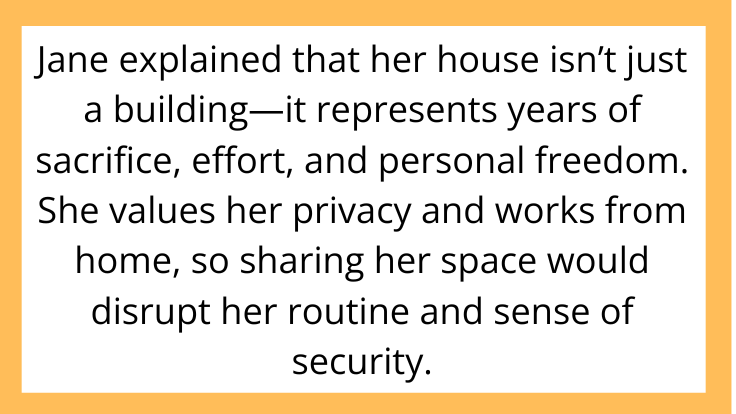AITAH for Refusing to Let My Fiancé’s Parents Move Into My House?
When it comes to family and boundaries, everyone has an opinion. Some believe you should always help your loved ones, no matter what it costs you. Others think protecting your peace and independence should come first. Today’s AITAH scenario is a perfect example of this tension—and it has sparked a fierce debate online.
The Background: When Family Needs a Place to Stay

Jane, a 29-year-old woman, shared her story on Reddit’s r/AITAH community. She owns her home, purchased entirely on her own after years of saving and working two jobs. Her fiancé, Alex, 30, moved in with her about a year ago when they got engaged.
Recently, Alex’s parents faced sudden financial troubles after his father lost his job. Unable to afford rising rent, they asked if they could move into Jane’s home “just temporarily”—six months, maybe less—until they got back on their feet.
Jane, however, wasn’t comfortable with the idea.
Jane’s Side: A Matter of Independence and Privacy

Jane explained that her house isn’t just a building—it represents years of sacrifice, effort, and personal freedom. She values her privacy and works from home, so sharing her space would disrupt her routine and sense of security.
Importantly, Jane wasn’t unwilling to help. She offered to contribute to her future in-laws’ rent or assist them with groceries and job searches. But she felt that letting them live under her roof would be too much.
Alex disagreed. He accused her of being selfish and cold-hearted for not welcoming his family in their time of need.
Alex’s Perspective: Family Comes First

From Alex’s point of view, family obligations are non-negotiable. He believes that if you truly love someone, you accept their family as your own. His argument was that it wouldn’t be forever—just long enough to help them land back on their feet.
Alex felt that Jane’s refusal was a sign that she didn’t care about his parents or the values he holds dear.
Jane, in turn, felt pressured and cornered.
The Community Responds: Who’s in the Wrong?

Reddit users weighed in with thousands of comments. The vast majority sided with Jane:
-
Top comment: “You’re not the villain. You offered help, just not at the cost of your peace and stability.”
-
Another popular reply: “Once someone moves in, it’s much harder to ask them to leave. Six months could easily turn into years.”
A smaller but vocal group sympathized with Alex:
-
“If you’re marrying him, you should be prepared to support his family when it really matters.”
This clash shows just how divided people are about where to draw the line between helping family and maintaining personal boundaries.
Compatibility or Dealbreaker?

Underneath this argument is a bigger question: Are Jane and Alex truly compatible?
Jane values independence, clear boundaries, and a sense of ownership over her space. Alex feels that family should take priority over personal comfort. These core differences could cause problems beyond this single issue—especially if they’re thinking about marriage.
A lot of commenters suggested that Jane and Alex see a counselor to explore whether their expectations for family and partnership are aligned.
Setting Boundaries Without Guilt

Jane’s story is a reminder that you can care about others without sacrificing your well-being. It’s possible to help without giving up your privacy or mental health.
Here are a few takeaways if you ever face a similar situation:
-
Be clear about your limits. It’s better to say no early than resent a situation later.
-
Offer alternatives. Just because you won’t let someone move in doesn’t mean you can’t help in other ways.
-
Stand firm but compassionate. You don’t need to feel guilty for having boundaries.
The Bigger Conversation: What Does “Family” Mean to You?

This scenario taps into a deeper conversation about what family means in modern life. Some people expect absolute sacrifice for relatives. Others believe that healthy relationships require limits.
There’s no single right answer—but it’s critical that partners understand each other’s expectations before they commit to a lifetime together.



